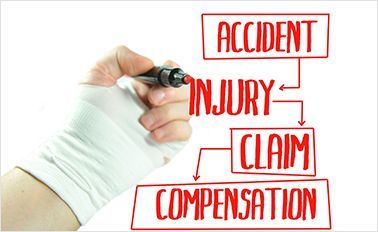
At Our Firm...
Justice Comes In The Form of a Check!
Fractured Foot - $210,000
Closed Head Injury - $400,000
Spinal Herniation with Teat - $100,000
Motor Brain Injury - $245,000
DO YOU HAVE AN
ACCIDENT ACTION PLAN?
Make no mistake... Our mission is you. When you are hurt in an accident, you must have a plan. Stop worrying. You are in the right place. We will handle the adjuster for you.
We Understand… Your Case is The Most Important Case
We are a personal injury law firm with a 38-year track record of recovering CASH SETTLEMENTS for car and motorcycle accidents, big-truck accidents, work accidents, medical malpractice, nursing home abuse, social security disability, slip & falls, and dog bite cases.
OUR FOCUS … take confusion and worry off your back! Your injury claim is handled for you from start to finish, and with care, by some of the best accident attorneys you’ll find in the Sunshine State.
We manage your medical treatment, tackle the endless paperwork, and fight insurance adjusters for you.
Relax, We’ve Got This!
Seeking the answer to, “personal injury attorney near me?”. You’re in the right place! If you are in need of a personal injury lawyer in Orange Park, Jacksonville, Palatka, Keystone Heights, Middleburg, or Starke, call us at (904) 777-JOHN for a FREE Case Strategy Review!
I MAKE INSURANCE COMPANIES PAY! ™
“We May Not Handle Every Injury Claim in Florida….
But We Sure Are Gonna Try”
OUR 5-STEP ACCIDENT ACTION PLAN FOR YOU

1. Protect You and Your Family After An Accident.
The confusion and frustration following an accident gets much worse when you are forced to deal with pushy insurance adjusters who may not have your best personal interests at heart. We take on insurance adjusters every day, so you don’t have to. As our client, you will never have to deal with insurance adjusters again. Stop worrying. That’s our job!

2. Get You To A Doctor Who Understands You And Your Injuries.
Many of our clients have never needed to see a doctor who specializes in personal injury care. Don’t worry. We’ve been dealing with medical injury specialists since 1983. We know the medical specialists who deal with traumatic injuries. Your dedicated accident lawyer will help you get to the right doctor.

3. Get Your Car Repaired Or Replaced
You need your vehicle repaired or replaced ASAP, and you need a rental car fast! We help our personal injury clients get their property damage claims handled quickly. No one wants to be without transportation!

4. Act Fast To Get Your Claim Paid.
Our team starts working on your case the minute you hire us. We know you need injury claim worries off your back so you can heal. We’ve got you covered from the minute you are onboard with us.

5. Get Connected With An Accident Lawyer Who Believes In Getting You Answers.
The sooner you schedule a consultation with one of the experienced accident injury experts at Accident Lawyer John Fagan, the sooner you can lay the groundwork for getting the compensation, medical benefits, and cash settlement you deserve. Call (904) 777-JOHN to have your case reviewed for free. And browse our site to find stellar resources and the best accident attorney near you—we're here to help!
Providing legal knowledge and personal service since 1983, Accident Lawyer John Fagan is dedicated to protecting the rights of accident victims in Orange Park, Middleburg, Palatka, Starke, and across North East Florida.
When you suffer an accident injury, it can devastate you and your family. To us, every case is personal, and we will fight for you. When you choose John Fagan as your injury & accident attorney, you can feel confident you have an attorney and a team with the experience needed for your case.
The stretch of roads between Orange Park, Middleburg, Palatka, and Starke, FL, can be at times treacherous and uninviting, resulting in countless auto, truck, and motorcycle accidents each year. If you or a loved one have been a victim of careless driving resulting in injury, you need an attorney who takes your case personally and cares about your needs.
The sooner you schedule a consultation with one of the experienced accident injury experts at Accident Lawyer John Fagan, the sooner you can lay the groundwork for getting the compensation, medical benefits, and cash settlement you deserve. Call (904) 777-JOHN to have your case reviewed for free. And browse our site to find stellar resources and the best accident attorney near you—we're here to help!
“There’s Never a Fee Unless
We Get Money For You!”
Client Testimonials
“John Fagan did an exceptional job in dealing with my accident claim. Daphne was also a key player in the settlement that I received. I would definitely use John Fagan (and Daphne) again if the need would ever arise in the future.”
– Rand Peterson
“The challenges that my daughter has experienced since her car accident last summer have been many. This law firm and their supportive staff have always had an open ear and were only a phone call or email away to answer questions…”
– Joan Brackin
FREQUENTLY ASKED QUESTIONS
We've compiled answers to some of the common questions you may have about our legal services.
Why is John Fagan Attorney so popular?
Choosing the right personal injury lawyer can make all the difference in the outcome of your case. At Accident Lawyer John Fagan, we have become a highly popular personal injury lawyer firm because of our 40-year track record of securing significant cash settlements for clients in cases ranging from car accidents and motorcycle accidents to workers' compensation claims. As a personal injury lawyer, we’ve earned the trust of thousands of clients by providing personalized attention and managing every aspect of their cases, from medical treatment to dealing with insurance adjusters. When you choose us as your personal injury lawyer, you’re choosing a team dedicated to fighting for your rights and getting you the compensation you deserve.
If you need a personal injury lawyer who will take the stress off your shoulders and handle your claim with professionalism, contact us at Accident Lawyer John Fagan today. Call (904) 777-JOHN for a free case review!
What areas of practice does your firm specialize in?
At Accident Lawyer John Fagan, we specialize in a wide range of personal injury cases. Our areas of practice include car accidents, motorcycle accidents, tractor-trailer accidents, workers' compensation claims, medical malpractice, nursing home abuse, slip and fall cases, social security disability claims, and dog bite injuries. We are dedicated to helping victims of accidents get the compensation they deserve across these areas.
What documents should I bring with me when I meet with a lawyer?
The more information your lawyer has, the easier it will be to decide if your case could be a success. Bring any documents that you think might be relevant, such as:
- Police reports/accident reports.
- Any eyewitness accounts obtained by the police or yourself.
- Copies of medical reports from doctors and/or hospitals.
- Insurance information, including any other parties involved in an accident.
- Relevant photos of injuries and/or damages.
- Notes you have written down at the scene of an accident.
- If you need help obtaining some of these documents, your lawyer can almost always obtain them for you.
What is the best way to contact you?
The best way to contact us is by phone at (904) 777-JOHN for immediate assistance. You can also reach us through the contact form on our website, and we’ll get back to you as soon as possible. We're here to help and provide a free case review!














